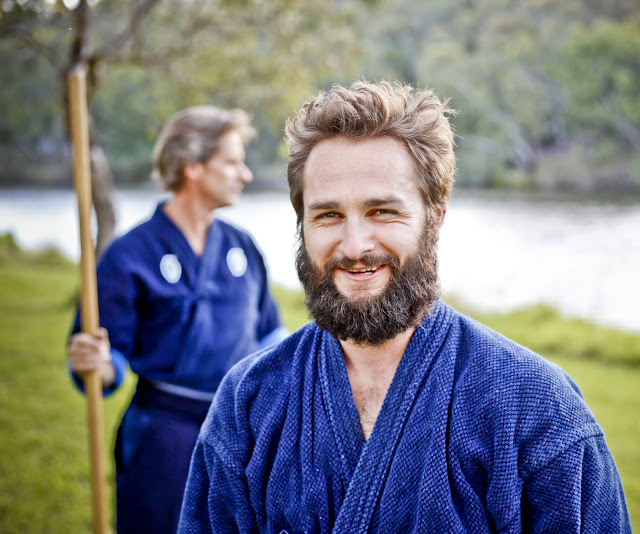POSTURE = MIND
Posture affects our mental state tremendously and vice versa. It’s why a lot of meditation traditions
advise you to straighten the spine when you sit. It’s not out of a need to be formal. It’s to
assist focusing the mind. When our posture slouches, our mind slouches. Once our eyes
cast downwards, our head naturally and unconsciously tilts forward, and our spine
follows. The overall physical state
produces a mental response and it’s never positive or alert.
In the dojo, our body holds a
collective memory, I believe. It has been
scientifically proven that muscles, however, do not hold any memory, but the
term, ‘muscle memory’, shouldn’t be discarded.
Unsui Sensei, always says, “Again, again, until your body remembers.” After endless repetitions, he says with a grin, "Hmmm, yes. I think now your body remembers." He knows, after 60 years of training, that
the body does have a collective consciousness.
Yes, it is stored in the brain, not the muscles, but hey…nuance, right?
So, Taj, remembered the posture
advice. He lost two matches and won
one. No matter where he was on the score
board, he never showed any physical manifestation of his inner disappointment
at the losses. As a result, his
opponents had no idea if they had the upper hand at any point. To the casual observer, he was winning,
if not now, then at any moment he could come back and break serve. More importantly, he played so much better and with more composure due to his physical state aiding his mental attitude. Regardless of the score, he'd won and he walked away knowing he'd gained, not lost.
When we lose our cool with ourselves, or give in to self-abusing inner dialogue, we display it in our body language. This is why it's important to maintain good posture, in and out of the dojo. No matter what's just happened, an erect spine with shoulders back and rolled down, gaze lifted, chin level and slightly back which aligns the ears over the shoulders; you will not only feel better physically, but mentally not be prone to discouragement or negativity. The world notices too and treats you accordingly.
We have a focus on posture and alignment in our art. This is for the efficiency of movement but also for the mental states it aids during times of adrenal stress. When we're under pressure, we become tight, tense and hunched. Shoulders come up, legs straighten, muscles tense which slows our movement. In tennis, my son's ball toss for the serve, becomes short, then it's hard for him to hit it over the net.
In the dojo, I keep telling my students to get lower, why? Not because "as low as you can go", is the best way to fight. It's because under pressure, you'll naturally end up on your toes without proper training to remain grounded. You'll lean forward or back and hunch your shoulders. Train a little lower than you need to in combat and in a fight you'll be sufficiently low enough and centred. Staying grounded and balanced is your best chance. Why do we use a bent elbow with our punches? Because under stress, you're going to over reach and lock out or hyper-extend your arm which leaves you prone to a counter such as an arm lock.
General posture and the angle of the spine and alignment of the limbs is essential in your attitude as well as your broader mental state. As I said earlier, they feed off each other. If you can't control your mind, focus on the body. For the most part, we can always correct the body quicker than our mental state, don't you agree?
Travis de Clifford - Katsuyoshi
Dojo cho, Kensho Dojo Australia
Travis de Clifford - Katsuyoshi
Dojo cho, Kensho Dojo Australia



Comments